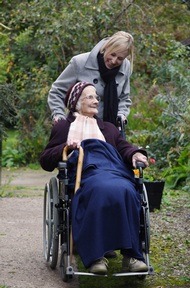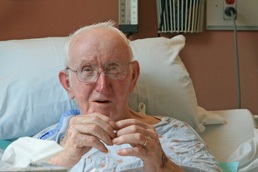Secretary of State warns 'primary care system has become reactive when it needs to be proactive'

Jeremy Hunt has called for the UK to have a proactive approach to care in his speech addressing the challenges facing the emergency care system in the UK.
The British Medical Association has responded to the comments made by the Secretary of State, labelling the Government’s analysis of the pressure on the emergency care admissions as ‘simplistic’.
Mr Hunt focused on the pressure on A & E departments describing them as ‘the biggest operational challenge facing the NHS’, and said that the decline in GP out of hours services, and the rise in complex long term illness’s which have increased due to an ageing population, are key factors to the problems facing the NHS.
Blaming decisions made by previous Governments, Mr Hunt said: “The decline in the quality of out of hours care follows the last government’s disastrous changes to the GP contract, since when we now have 4 million more people using A & E a year compared to 2004.”
Dr Laurence Buckman, chair of the BMA’s GP committee, has defended GP’s, claiming that Mr Hunt has unfairly laid blame on GP’s themselves and previous governments.
Dr Buckman said: “The BMA has made it clear for many years that the provision of out-of-hours care in England needs to be improved, particularly in how it is resourced and co-ordinated, but it is wrong to blame the GP contract for problems with the system. The Government’s analysis of the problem is extremely inaccurate.
“Out-of-hours care has historically been badly underfunded even before the introduction of the GP contract in 2004. Despite rising patient demand, funding has remained static in the last few years. The bungled introduction of NHS 111, which was intended to alleviate pressure on the system, has just made matters worse.”
Mr Hunt also highlighted the increase of long term illness as a key pressure that emergency services are facing.
He continued: “Because of the ageing population, fully one quarter of the population - that’s 15 million people - have a long term condition like diabetes, dementia or asthma. Although these conditions can’t be cured, they can be alleviated, treated and sometimes kept at bay.

“This is a huge challenge for an NHS set up primarily to deal with one-off episodes and curable illnesses - whether cancer, a new knee or a broken leg. Because unlike when the NHS was founded 65 years ago, now half of GP appointments and two thirds of outpatient/A & E visits are for people with long term conditions.”
However Dr Mark Porter, chair of the BMA, has hit back at the secretary of state, and criticised his approach to the problems facing emergency services.
Dr Porter said: “There is no doubt that the NHS is under intense pressure. Spending on healthcare is squeezed, patient demand is rising and staffing levels are often inadequate. The Government’s analysis of where responsibility lies for the huge and increasing pressure on emergency care is completely simplistic. Singling out individual parts of the health service and engaging in a blame game is unhelpful and misses the point.
“Ministers should be engaging positively with healthcare professionals to improve and maintain services for patients, rather than demoralising NHS staff who are working harder than ever with fewer resources, wherever they are in the service.
The speech described how the Secretary of State plans to alleviate the enormous strain on services caring for people with long term illnesses.
Mr Hunt said: “Old age should be celebrated, not dreaded. So we need an NHS and social care system where care is just as important as treatment.”
Mr Hunt described a need to have person centred approach to treatment, and said: “Sometimes, despite the best intentions of doctors and nurses, the NHS can send patients from pillar to post for referrals and appointments and follow-ups, while their own individual wishes are ignored.

“The buzz word for this is “integration.” I agree with Chris Ham of the Kings Fund that integration is today what waiting times were a decade ago – the central challenge that defines modern healthcare. “Our primary care system has become reactive when it needs to be proactive.
“Too often people with long term conditions are left to their own devices, without the help, care and guidance that local services should provide.
“Many hospitals and care homes understand that compassionate care and support does not just come from outstanding nurses and healthcare assistants. It also comes from friends, families, carers and the social networks that sustain all of us at our most vulnerable.”
Addressing dementia specifically, My Hunt said: “One quarter of all the people in hospital and 80% of the people in care homes have dementia. One in three of patients admitted to hospital with a hip fracture, for example, have dementia.
“Quite simply we fail to give the majority of people with dementia access to the right treatment and care. And we fail to support to their families and carers in the way we should.
“NHS England will shortly be announcing its new ambition for national dementia diagnosis rates alongside proper care plans for all those diagnosed.
“But again when it comes to the joining up of care and services, commissioners have a key role in eliminating the interminable forms, the alphabet soup of different contacts and the feeling of being passed around the houses by different professionals.”
Mr Hunt concluded that the success of the change in approach to long term care is essential, and said: “Get this wrong and we will have flunked the biggest challenge facing our healthcare system. “But get it right - as I believe we can - and Britain truly will be the best country in the world to grow old in.”
Latest News
 29-Jul-24
Dementia Bus gives carehome.co.uk staff insight into life with dementia
29-Jul-24
Dementia Bus gives carehome.co.uk staff insight into life with dementia
 01-Mar-24
Find out the top care homes in 2024
01-Mar-24
Find out the top care homes in 2024
 21-Mar-23
UK's top care homes in 2023 revealed
21-Mar-23
UK's top care homes in 2023 revealed
 03-Jan-23
carehome.co.uk launches free care helpline
03-Jan-23
carehome.co.uk launches free care helpline
 13-Dec-22
5 mins with Emily Whitehurst, chief operating officer for Constantia Healthcare
13-Dec-22
5 mins with Emily Whitehurst, chief operating officer for Constantia Healthcare